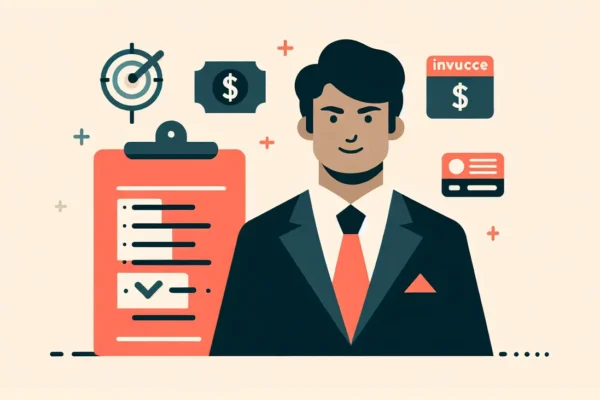Dealing with late invoice payments can be a tricky path to navigate, especially when maintaining a positive relationship with clients is essential. In a world where cash flow is king, finding effective, diplomatic ways to encourage timely payments without straining professional relationships is crucial. This blog will explore twelve strategies that combine simplicity, clarity, and a touch of empathy to transform the way you handle late payments, making the process engaging and manageable.
1. Set Clear Payment Terms Upfront
Setting clear payment terms upfront is crucial to ensuring healthy cash flow and minimizing late payments. It’s vital to establish a transparent communication channel with your clients from the get-go, clearing up any potential confusion about payment expectations. This not only secures your financial rights but also builds a foundation of trust and professionalism. Depending on your business model, consider requiring a deposit or partial payment upfront, particularly for larger projects or new clients. This approach not only guarantees a portion of your payment earlier but also commits the client to the transaction, reducing the risk of late payments.
2. Use Polite Payment Reminders
The importance of politeness cannot be overstated when it comes to sending payment reminders. A friendly reminder a week before the due date can significantly reduce the number of late payments. Utilizing automated invoicing software can streamline this process, ensuring that reminders are sent out consistently and on time. Remember, the goal is to maintain a positive relationship with the client; therefore, keeping the tone of your reminders courteous and professional is key. Personalizing these reminders can also add a thoughtful touch, showing your clients that you value their business beyond the transaction. Effective communication is a powerful tool in maintaining steady business operations and ensuring timely payments.
3. Leverage Technology for Invoicing
Embracing technology can dramatically change how you manage invoicing and payments. Digital invoicing systems not only streamline the billing process but also provide a straightforward way for your clients to make payments. Features like automated reminders, tracking, and instant online payment options can expedite the payment process. Cloud-based invoicing software offers real-time insights into your financials, allowing you to act quickly on overdue invoices. Additionally, these systems reduce paperwork and administrative burden, freeing up valuable time that can be better spent on growing your business.
4. Offer Multiple Payment Methods
In today’s digital age, offering multiple payment methods is more of a necessity than a convenience. By accommodating your clients’ preferred payment methods, you’re likely to receive payments faster. Whether it’s credit card, ACH transfer, or online payment platforms like PayPal, giving clients the flexibility to pay in the manner most convenient for them can significantly decrease the chances of late payments. Streamlining the payment process not only enhances customer satisfaction but also encourages prompt payments, enhancing your company’s cash flow.
5. Implement Late Fees
While no one likes to impose penalties, implementing late fees can be an effective method for encouraging on-time payments. Be transparent about these fees from the outset, detailing them in your initial contract or payment terms. This clarity helps set expectations and underscores the importance of timely payments. Communicate gently but firmly that late fees are not a punitive measure but rather a necessary policy to keep your business operations smooth and fair for all clients. Establishing a fee for late payments underscores your terms are to be taken seriously and can motivate punctuality in payments.
6. Provide Payment Plans for Struggling Clients
Empathy goes a long way, especially when clients are facing financial difficulties. Offering payment plans can be a compassionate approach that helps maintain client relationships while ensuring that you still get paid. Structured correctly, payment plans can provide a win-win scenario—clients are granted the flexibility they need, and you secure a timeline for receiving your payments. Be proactive in identifying clients who may benefit from this option and offer it as a solution before their invoices become overdue. This approach not only demonstrates understanding and partnership but also establishes a clear path for payment. Flexible payment solutions encourage client loyalty and long-term business arrangements.
7. Foster Strong Client Relationships
Strong client relationships are the backbone of any successful business. By investing time and effort into understanding your clients’ needs and maintaining open lines of communication, you can preempt many issues related to late payments. Regular check-ins and an attentive ear can alert you to potential payment issues before they arise, allowing for proactive solutions. Building such relationships requires more than just excellent customer service; it relies on creating genuine connections and showing your clients that you value and respect their business. When clients feel valued, they’re more likely to make on-time payments a priority.
8. Regularly Review and Update Contracts
The business world is always evolving, and your contracts should reflect this dynamic landscape. Regularly reviewing and updating your payment terms and conditions can help prevent late payments. Ensure your contracts are clear, concise, and reflective of your current business practices and policies regarding late payments. Updating your contracts not only protects your business legally but also provides an opportunity to discuss and reaffirm payment expectations with your clients. A yearly contract review can preempt legal issues and set a professional tone for your business transactions.
9. Engage in Direct Communication
Direct and clear communication is indispensable in managing late payments. When an invoice becomes overdue, reach out to your client personally to inquire about the delay. Often, late payments can result from simple oversights or misunderstandings that can be quickly resolved through a straightforward conversation. Effective communication fosters mutual understanding and can pave the way for faster resolution of payment issues. Such conversations can also provide insights into your clients’ payment processes, allowing you to adjust your follow-ups accordingly. Remember, the goal of direct communication is resolution, not confrontation, which fosters a cooperative rather than adversarial relationship.
10. Use a Factoring Service
For businesses needing immediate cash flow, using a factoring service could be a viable option. Factoring allows you to sell your outstanding invoices at a discount to a third-party entity that then takes on the responsibility of collecting the payment. While this means receiving less than the full invoice amount, it provides immediate liquidity and takes the burden of chasing payments off your shoulders. This can be particularly useful for businesses that cannot afford to wait for extended payment terms. Selecting the right factoring service requires careful consideration to ensure it aligns with your business needs and goals.
11. Seek Legal Advice When Necessary
There may come a time when seeking legal advice is the appropriate step for recovering late payments. If communications and negotiations fail, a strongly worded letter from a solicitor can underscore the seriousness of the situation to your client. Before taking legal action, consult with legal experts to understand your rights and the potential for recovery. Understanding the legalities of late payments is critical to protect your business interests without damaging client relationships unnecessarily. This step should be considered a last resort, used only when all other avenues have been exhausted.
12. Educate Your Clients on the Importance of Timely Payments
Educating your clients about how timely payments impact your business can create a culture of punctuality and respect. Share insights into how smooth cash flow facilitates better service delivery and allows for reinvestment in the business, which ultimately benefits them. Transparent conversations about the financial workings of your business can foster empathy and understanding, encouraging clients to prioritize payments. This educational approach should be part of your ongoing communication strategy, reinforcing the message that prompt payments are crucial for the mutual growth and success of both parties.







